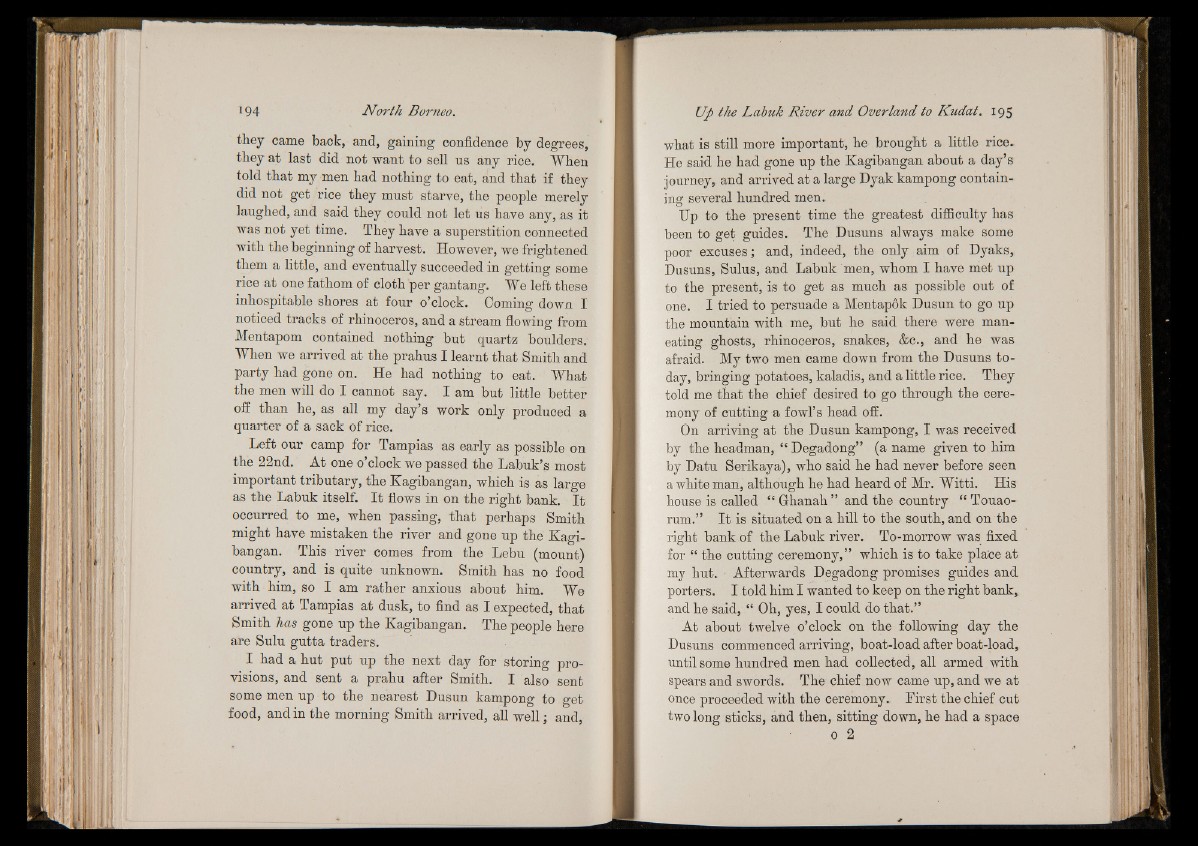
they came back, and, gaining confidence by degrees,
they at last did not want to sell us any rice. When
told that my men had nothing to eat, and that if they
did not get rice they must starve, the people merely
laughed, and said they could not let us have any, as it
was not yet time. They have a superstition connected
with the beginning of harvest. However, we frightened
them a little, and eventually succeeded in getting some
rice at one fathom of cloth per gantang. We left these
inhospitable shores at four o’clock. Coming down I
noticed tracks of rhinoceros, and a stream flowing from
Mentapom contained nothing but quartz boulders.
When we arrived at the prahus I learnt that Smith and
party had gone on. He had nothing to eat. What
the men will do I cannot say. I am but little better
off than he, as all my day’s work only produced a
quarter of a sack of rice.
Left our camp for Tampias as early as possible on
the 22nd. At one o’clock we passed the Labuk’s most
important tributary, the Kagibangan, which is as large
as the Labuk itself. I t flows in on the right bank. I t
occurred to me, when passing, that perhaps Smith
might have mistaken the river and gone up the Kagi-
bangan. This river comes from the Lebu (mount)
country, and is quite unknown. Smith has no food
with him, so I am rather anxious about him. We
arrived at Tampias at dusk, to find as I expected, that
Smith has gone up the Kagibangan. The people here
are Sulu gutta traders.
I had a hut put up the next day for storing provisions,
and sent a prahu after Smith. I also sent
some men up to the nearest Husun kampong to get
food, and in the morning Smith arrived, all well; and,
what is still more important, he brought a little rice.
He said he had gone up the Kagibangan about a day’s
journey, and arrived at a large Dyak kampong containing:
several hundred men.
Up to the present time the greatest difficulty has
been to get guides. The Dusuns always make some
poor excuses; and, indeed, the only aim of Dyaks,
Dusuns, Sulus, and Labuk men, whom I have met up
to the present, is to get as much as possible out of
one. I tried to persuade a Mentapok Dusun to go up
the mountain with me, but he said there were man-
eating ghosts, rhinoceros, snakes, &c., and he was
afraid. My two men came down from the Dusuns to day,
bringing potatoes, kaladis, and a little rice. They
told me that the chief desired to go through the ceremony
of cutting a fowl’s head off.
On arriving at the Dusun kampong, I was received
by the headman, “ Degadong” (a name given to him
by Datu Serikaya), who said he had never before seen
a white man, although he had heard of Mr. Witti. His
house is called “ Ghanah ” and the country “ Touao-
rum.” I t is situated on a hill to the south, and on the
right bank of the Labuk river. To-morrow was fixed
for “ the cutting ceremony,” which is to take pla'ce at
mj hut. Afterwards Degadong promises guides and
porters. I told him I wanted to keep on the right bank,
and he said, “ Oh, yes, I could do that.”
At about twelve o’clock on the following day the
Dusuns commenced arriving, boat-load after boat-load,
until some hundred men had collected, all armed with
spears and swords. The chief now came up, and we at
once proceeded with the ceremony. First the chief cut
two long sticks, and then, sitting down, he had a space
0 2